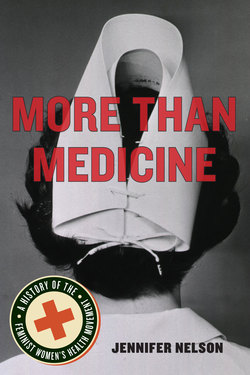Читать книгу More Than Medicine - Jennifer Nelson - Страница 7
На сайте Литреса книга снята с продажи.
Acknowledgments
ОглавлениеAfter finishing my first book, I wondered if I would ever write another. Juggling a young son, single parenthood, and a new job as an assistant professor of women’s and gender studies made the task seem daunting. But I kept at it; “slow and steady wins the race,” a graduate school mentor once told me. In the end, a book is a labor of love and gets written because it needs to be written. That was the case with this book because in many ways it completes my first book. I had left so much unwritten.
This book could not have been written without a full-year sabbatical supported by the University of Redlands. Redlands also generously granted travel funds to help complete research during that year. I had been working little by little on a series of articles, but the year away from courses and administrative duties as director of the Women’s and Gender Studies Program finally allowed me the time to understand the scope of this larger project and how I might complete it as a book.
Several colleagues at the University of Redlands have been consistently supportive by sharing ideas, escaping for coffee or drinks (while sharing ideas), and reading chapters of this book in article form. The three colleagues (and dear friends) who top this list are Dorene Isenberg, Kathleen Feeley, and Priya Jha. Other friends and colleagues at the University of Redlands have motivated me through inspiration: these include Leela MadhavaRau, Kelly Hankin, Karen Derris, Leslie Brody, Emily Culpepper, and Kathy Ogren.
Beatrix Hoffman, another good friend and graduate student comrade at Rutgers, read and commented on several chapters while they were still in article form. Beatrix has also been an inspiration since our graduate school years. I thank her for her intelligence and insight into medical and health care history and politics.
Rickie Solinger has also provided motivation and support over the years. She was one of the readers of the manuscript draft and later revealed that to me. Her critical and constructive comments on the earlier drafts certainly made this book stronger. I also thank the anonymous second reader for her careful comments.
I had the very good fortune to be invited to the summer 2013 conference in Münster, Germany, titled “Refocusing the Modern American Family.” I want to thank the organizers of that conference for inviting me and allowing me to present a portion of this book. That conference also afforded me the opportunity to meet Johanna Schoen, who very kindly agreed to take time out of her very busy schedule to read the manuscript in its entirety. Her careful feedback most certainly improved the book, while all errors still remain my own, of course.
I also presented portions of this book at the Sallie Bingham Center for Women’s History and Culture while visiting Duke University on a Mary Lily Research Grant. Archivist Laura Micham provided invaluable assistance with the Feminist Women’s Health Center Records. Smith College granted me a Margaret Storrs Griers Research Grant, which facilitated travel to and use of the Sophia Smith Collection.
Several activists granted me interviews for this book. I won’t name all of them here, but I need to explicitly thank Loretta Ross, scholar and activist for reproductive justice. Loretta’s social justice activism and powerful advocacy for women with the least access to reproductive control over their lives has been a true inspiration. She also read the manuscript in its entirety before publication, for which I am also truly grateful.
I also want to thank Denise Spencer for her unfailing administrative support. Her humor and personal strength are terrific bonuses. I couldn’t direct the Women’s and Gender Studies Program without her.
My students at Redlands have also helped me link teaching to research pursuits. Their curiosity about feminist activism encourages me to believe that feminism is alive and well with young women and men. They want to know more about the activists who preceded them, so we need to keep writing for them. Some of them, Abe Weil and Sami Poindexter, have gone on to graduate school themselves and will soon be writing their own books. A couple more, Sabrina Johnkoff and Rachel Thomas, are well on their way to becoming scholars as well.
My son, Nicholas Pierre, was only three years old when my first book was published. When he was little he would take the book out and find his name in the dedication. At fourteen, he may not care quite as much about getting a mention, but, Nicholas, you should know that your good humor, intelligence, musical ability, and charming shenanigans make every day a joy. I look forward to seeing you flourish as a young man.
Finally, thank you to my partner (and now husband), Thomas Cahraman, for everything you do every day. You make life so much better.
